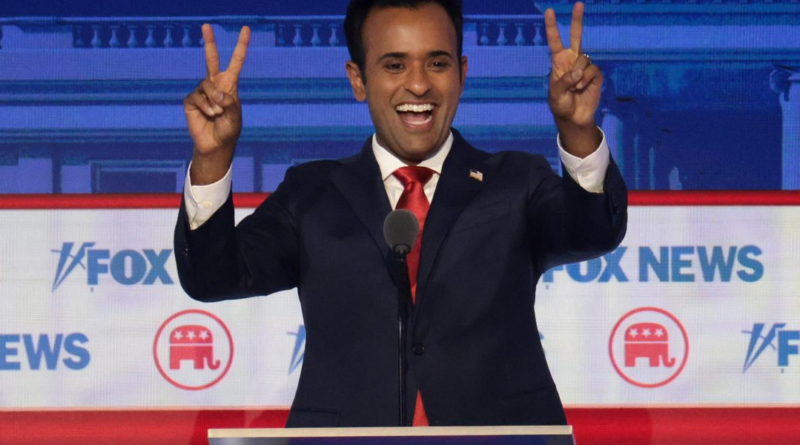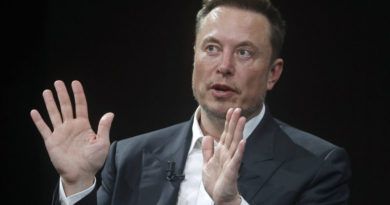How Vivek Ramaswamy, the surprise GOP debate star, made his fortune and triggered his critics
Republican interloper-turned-headline-act Vivek Ramaswamy gained outsized attention for his performance in the GOP primary debate Wednesday night, clashing with rivals, throwing red meat to the conservative base, and repeatedly pitching himself as a business magnate who can execute his party’s turnaround.
Ramaswamy’s exact net worth is difficult to pin down. Forbes estimates it’s just under a billion dollars, depending on market conditions.
At 38, Ramaswamy has zero public service experience and shows little evidence of a political ideology prior to 2020, one of only two presidential elections he voted in. He’s counting on voters evaluating his commander-in-chief potential by examining his business track record. On that front, even critics acknowledge that Ramaswamy has achieved financial success. Forbes estimates his net worth at just under a billion dollars, depending on market conditions. But Ramaswamy also often exaggerates his corporate accomplishments and obfuscates how they came about.
He started his career as a hedge fund manager, earning millions, but hardly enough to catapult him into the ranks of the obscenely wealthy. He then staked out on his own to start a biotech company that purported to have a new strategy for finding drugs to develop.
Some claim that Ramaswamy inflated his own success and wealth when speaking publicly. As they tell it, he sold investors and the public on the notion that his biotech companies were developing promising drugs, and then cashed out regardless of whether they actually did, according to the New York Times. “Everything about him is a scam,” Jeffrey Sonnenfeld, a well-known Yale School of Management professor and regular Ramaswamy critic, tells Fortune. “It’s a card game. He creates illusions to be something that he is not so it’s basically a game of diversion and distraction.”
Ramaswamy’s campaign did not respond to a request for comment.
Critics describe Ramaswamy as yet another example of a rich man who wants to add the national spotlight to his list of accomplishments. Since entering the GOP race in February, his poll numbers have risen to 11%, according to a Fox News poll of Republican primary voters earlier this month. But rival Republican candidates seem less enthused by either his outsider status or his business experience, which they attacked on Wednesday for being irrelevant to the presidency.
“We don’t need to bring in a rookie,” former Vice President Mike Pence said during a heated exchange about the nation’s rising debt during the debate, ignoring the fact that he served under another president—Donald Trump—who had no prior political experience.
Rawamaswamy’s business experience points to his desire to shake up entrenched industries, often in opposition to incumbent players by challenging, even mocking, their adherence to the status quo. After graduating with an undergraduate degree in biology from Harvard University in 2007, Ramaswamy started his career at the hedge fund QVT, where he became a partner at 28. While there, he put his biology degree to work, carving out a space for himself as a go-to source for unlikely, but ultimately lucrative biotech deals.
In 2014, he founded Roivant, a company that promised to upend drug discovery and become “the highest return on investment endeavor ever taken up in the pharmaceutical industry,” he said in a 2015 interview. (His former boss and QVT founder, Dan Gold, now sits on Roivant’s board.)
Roivant’s strategy was to cheaply buy the rights to potential drugs that big pharma companies like Pfizer, Merck, and GSK had shelved for various reasons and take them through clinical trials all the way to market. To get the cheap initial price, the company promised the major pharma companies a cut of any future profits.
The strategy raised a few eyebrows.
“I know I run the risk of looking like a fool two or three years from now, but this sounds like some people are being bamboozled,” said MIT Sloan School of Management professor Pierre Azoulay told health publication STAT in a 2016 article about Roivant’s founding. At the time the biotech industry was in the midst of a wave of huge investments, some of which went to companies with significant hype whose research ended up not panning out, yielding no viable medicines.
An early failure first put Ramaswamy on the press’ radar. In 2014, Roivant paid just $5 million upfront to acquire an Alzheimer’s treatment that GSK had abandoned. Roviant then turned the potential drug into a startup, Axovant, which it took through a $2.2 billion initial public offering in 2015—a record amount for a biotech company at the time. Ramaswamy made at least $38 million the year of Axovant’s IPO, according to Forbes. Two years later, however, the company’s only drug failed a clinical trial and its stock plummeted. By March of last year,, Ramaswamy had wound down his stake in Axovant (since rebranded to Sio Gene Therapies) from 78% to 25%. Axovant’s stock price now sits at 39 cents.
“He’s a very wealthy guy,” Sonnenfeld says. “The issue is that it was built by basically a version of pump and dump.”
Roivant netted some big-money deals during Rawamaswamy’s tenure. Most notably in 2019 it entered into a $3 billion deal for Japanese pharmaceutical company Sumitomo Dainippon Pharma to purchase five drugs Roivant was developing in addition to an 11% stake in the firm. As of May, Ramaswamy retains a 7% stake in Roviant, which currently has a market capitalization of $8.7 billion, making Ramaswamy’s stake worth about $609 million.
Sonnenfeld points out that Ramaswamy’s surrogates call him a billionaire, but Ramaswamy doesn’t refer to himself as such.
Whatever his exact net worth, it’s clear Ramaswamy is at least wealthy enough to pump $10 million into his own campaign. In a May interview he said there was “no limit” to how much of his own money he would spend on his campaign, Fox News reported.
Ramaswamy left Roivant in early 2021 because of his “increasing public engagement” that included multiple Wall Street Journal op-eds and a book, Woke Inc, that criticized socially responsible corporate practices. He would turn that disdain into another business idea, launching the “anti-woke” fund Strive Asset Management. Strive’s flagship ETF, Strive US Energy, has 25% fewer assets under management than it did at the start of the year. “It’s a disastrous investment philosophy,” Sonnenfeld says.
Presumably, Ramaswamy’s disdain for ESG and “woke corporations” were meant to set the stage for his eventual presidential run. But Sonnenfeld sees a parallel between Strive Asset Management, Ramaswamy’s work in biotech, and his bid for the Republican nomination: “He’s riding a fad.”


